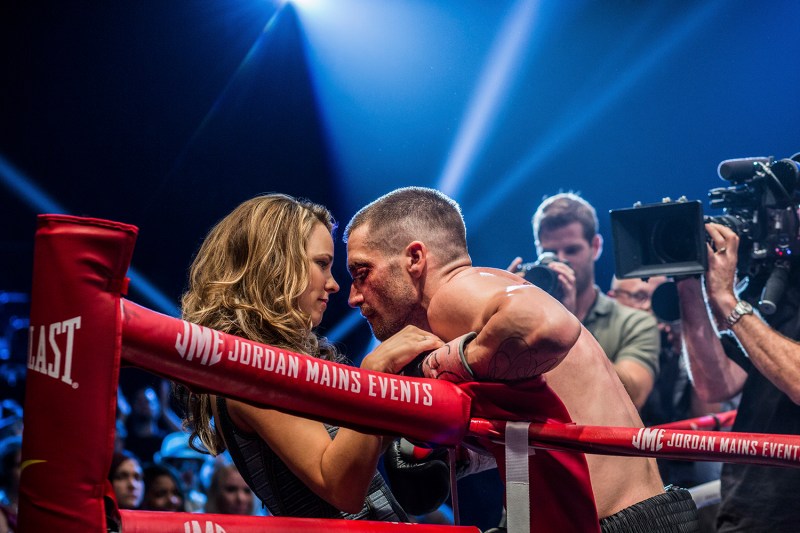Professional boxing may not be America’s pastime, but that hasn’t stopped Hollywood from continuing to produce boxing movies, often to great success. Director Antoine Fuqua’s latest film, “Southpaw,” enters the ring as a quintessential boxing tale, one in which the consistently phenomenal Jake Gyllenhaal submerges himself in yet another demanding role. “Southpaw” brings a captivating tale of redemption to life in a satisfying mix of well-executed boxing matches and touching father-daughter moments, even if these assets are trapped within a melodramatic and formulaic storyline.
Gyllenhaal is the fictional Billy Hope, the undefeated light heavyweight champion boxer with a perfect wife, Maureen, (Rachel McAdams) and supportive daughter, Leila, (Oona Laurence) both cheering him on. During a charity gala, the uncontrollable anger that serves Hope so well in the ring becomes his downfall, and he engages in a chaotic brawl that results in the accidental fatal shooting of Maureen. Devastated and unable to move forward without his wife, Hope spirals out of control, eventually losing custody of his daughter, his wealth and his title. Desperate to get his little girl back, Hope takes a job as a night janitor for Titus “Tick” Wills (Forest Whitaker), a boxing trainer who agrees to take him on. The ensuing tale of redemption sees Hope determined to regain his former glory, find peace with the death of his wife and most importantly, regain custody of his daughter.
Gyllenhaal, who packed on an additional 30 pounds of muscle for the role, erupts with bold, dominating vigor in another knockout performance of his impressive career. He seizes the intimidating character, one that was originally written for Eminem, and brings not only a convincing physique, but a fully-realized range of emotion and distinctive body language. His intense preparation is obvious, and Hope’s offensive, aggressive boxing style is consistent and precise. While other, less capable performers may have been swallowed up by the typical stock character of an impassioned prize-fighter determined to fight and redeem himself, Gyllenhaal gives Hope a life and character of his own. Hope’s deeply personal, vulnerable moments with his daughter are mesmerizing, as Gyllenhaal slowly uncovers a poignant and touching side of a seemingly unsavory lout. The resulting “anti-hero” both epitomizes a common struggle for immortal greatness, as well as inspires and captivates with his genuine affection for his child and his down-to-earth honesty. Gyllenhaal is a credit to his generation, and once again proves he packs a powerful punch.
“Southpaw” adopts sharp, gritty action-packed shots that certainly do justice to Gyllenhaal’s superb performance. High angles and extreme close-ups characterize the majority of the scenes, and pay off immensely in the boxing matches, as the full force of every jab is palpable in the magnified glimpses of Hope’s wounded eye or bleeding mouth. The majority of the punches are focused directly at the lens, adding emphasis to their power and accentuating the utter chaos and desperate combat that takes place during a match. These close-ups also serve the film well outside the ring, exposing Gyllenhaal’s elaborately detailed facial expressions and Hope’s softer, more delicate interactions with his daughter.
Yet, close-ups alone can not make the well-worn boxing ring memorable. Fortunately, the choreographed brawls are not only delightfully entertaining, but intelligently designed to echo the distinct personalities of the dueling. It makes sense, for instance, that Hope, something of an overconfident hothead, would be totally dependent on his offense. The punch-drunk boxer never once bothers to block a hit, until newly found resolve and a reformed training program build his defensive technique, allowing him to defend blows just as efficiently as he can deliver them. The resulting matches are engaging, pure paragons of character, particularly the final match, a riveting nail-biter that pits Hope against a highly-skilled boxer involved with the death of his wife in a match that will make or break his career. These fights, well-paced and surprisingly varied, easily carry the film’s intensity and repeatedly succeed in raising the stakes.
While the film is certainly entertaining, the script sticks perhaps too closely to the tried-and-true tale genre clichés and, while committing no obvious sins, simply doesn’t attempt anything groundbreaking or unpredictable. The classic plot is all too familiar — the ill-tempered boxer with a tragic life story is given the opportunity to fight in the match of a century, but first must undergo a series of training montages with a jaded coach in order to evolve into a new kind of fighter.
The writer, Kurt Sutter (“Sons of Anarchy”), attempts to account for this by injecting the plot with excessive melodrama contrived to distract from the easily foreseeable outcome, yet the conclusion of every scene can still be predicted before even beginning. Even though Gyllenhaal brings his own unique character into vision, the film fails to break free of its biggest restriction: It’s just another boxing movie.
Still, there’s a reason the boxer’s journey is so frequently represented on the screen; the story perfectly combines raw action, powerful drama, dark humor and inspirational fuel, and “Southpaw” delivers every bit of these in a thrilling, dynamic two hours.
Contact Shannon O’Hara at shannonnohara16 ‘at’ mittymonarch.com.
